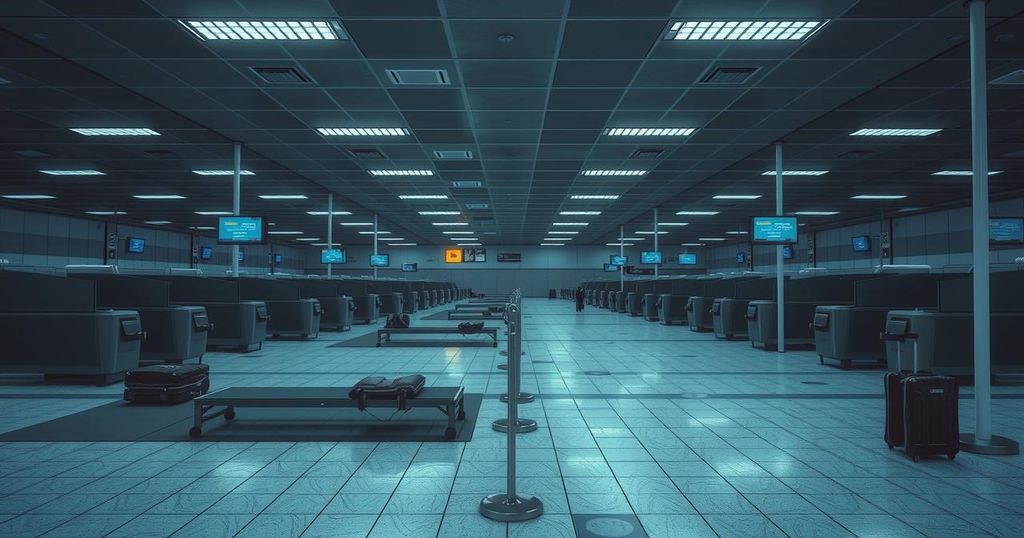US President Trump Revives Controversial Travel Ban Targeting Multiple Countries
President Donald Trump’s reinstatement of a travel ban affects multiple countries, including Cuba and Iran, causing widespread concern in the travel and tourism industry. This situation brings chaos to airports and impacts students, professionals, and businesses. Legal challenges are expected, as the human toll behind the travel restrictions highlights a pressing need for empathy and global connection amidst rising tensions.
The United States is heading into treacherous territory once again as President Donald Trump reinstates a broad travel ban with controversial implications. This latest iteration targets numerous countries including Cuba, Burma, Turkmenistan, Iran, Laos, Sierra Leone, Venezuela, and others, and is more expansive in nature. With tensions rising and international mobility affected, the air travel landscape is bracing for a tumultuous shift. Understanding the reasons behind this sweeping action, and its immediate effects, is critical for travelers and industry stakeholders alike.
As the travel industry reels from this surprise announcement, worries are mounting over how it will impact global tourism and airline operations. Trump’s new vice on travel reawakens the fears of international exclusion as it bans entry from a total of 13 countries while tightening restrictions on eight additional nations. The policy comes into effect at the remarkably early hour of 12:01 a.m. on Monday, and the chaos that unfolds could have lasting effects across airports and immigration systems worldwide.
The nations on the travel ban list include Afghanistan, Burma, Chad, and several others often tied to significant diaspora communities and tourism connections with the U.S. This ban, though framed as a safeguard for national security, raises uncomfortable questions about its broader geopolitical and economic fallout. For many international students, professionals, and casual travelers, this is not just an inconvenience but a potential disaster for planned trips.
Airports are preparing for the inevitable chaos reminiscent of the 2017 travel ban. With possible detentions and rebooking demands looming, airlines and immigration officers are bracing for a major operational upheaval. This could lead to unexpected cancellations, declining ticket sales, and confusion for passengers who may find themselves entangled in new protocols.
The tourism sector already shows signs of shrinking. While the individual traveler volumes from some affected countries may not appear significant, they contribute greatly to niche segments such as visiting relatives, religious travel, and educational exchanges. Many businesses—ranging from hotels in cities with large immigrant populations to travel agencies catering to specific communities—face sudden revenue losses and cancellations, throwing entire summer travel plans into uncertainty.
International reactions are beginning to shape this situation as countries on the ban list may respond with their own travel restrictions or advisories against the U.S. Passthrough services and visas might be affected, and strained relationships could complicate broader negotiations on security, trade, or humanitarian efforts. The risk of long-term damage to the tourism image of the United States is substantial.
Expected legal challenges from civil rights groups could follow swiftly after this declaration, similar to past attempts to navigate the court system. The earlier versions of the travel ban faced heavy judicial scrutiny, so whether this new proclamation can withstand opposition remains uncertain. However, the current political landscape may complicate matters further, with shifting public sentiments around immigration and national security at play.
Travel technology platforms now face mounting pressure to recalibrate their systems to reflect the newly imposed restrictions. Booking sites will need to guide clients through the twists of compliance as they process cancellations and modify itineraries. Agencies dealing with affected communities are particularly strained, as they must manage the emotional fallout of these abrupt changes.
Ultimately, the human cost of this travel ban transcends numbers and policies—it reaches into the lives of countless individuals. Families separated, business meetings thwarted, and students kept from their educational paths paint a profound picture of disruption amidst this revived travel ban. As the world increasingly values connectivity, such policies might instead erect barriers just as bridges are critically needed.
As the summer season approaches, the travel industry finds itself at a crossroads. The revival of this travel ban not only presents domestic challenges but threatens the global fabric of travel itself. It is a moment for industry leaders to rethink their approaches amid heightened uncertainty; the stakes have become painfully clear, and this summer may be marked not by vacations taken but by opportunities denied.
The reinstatement of the travel ban under President Trump has generated serious concern across the travel sector, impacting individuals, families, and businesses tied to the countries affected. The ethical implications of such policies pose questions on national security versus global mobility. As airports prepare for potential chaos and industry stakeholders grapple with the fallout, the human cost behind such restrictions reminds us that travel is often not just about leisure, but about connection and community in a divided world.
Original Source: www.travelandtourworld.com




Post Comment